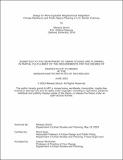Design for More Equitable Neighborhood Adaptation: Climate Resiliency and Public Space Planning in U.S. Border Colonias
Author(s)
Strech, Mikaela
DownloadThesis PDF (21.10Mb)
Advisor
Ryan, Brent
Terms of use
Metadata
Show full item recordAbstract
The relationship between environmental harms and the political and economic marginalization of communities cannot be easily disentangled in today’s world. Consequently, this thesis reexamines the relationships between planners, designers, and communities in response to environmental challenges that marginalized communities face. I advocate for beginning with incremental advancements in adaptation in design using community organization and a site and services approach as a way of contending with resource constraints and urgent issues. Acknowledging that this design work simultaneously enhances social resiliency, I argue that the timeliness of this approach promotes resilience.
The research analyzes design and planning strategies for neighborhood scale environmental design, drawing from case studies in Puerto Rico, Detroit, Nairobi, and Texas. These insights inform conceptual framework plans in three neighborhoods to test what an incremental, nature-based approach to environmental hazards might accomplish, and how. This thesis has a specific focus on US border colonias in Texas, where flooding and disparities in adaptation and recovery resources are especially relevant. Considering the projected growth of fringe neighborhoods across the United States, this study contributes to the dialogue on equitable resilience.
Date issued
2023-06Department
Massachusetts Institute of Technology. Department of Urban Studies and PlanningPublisher
Massachusetts Institute of Technology